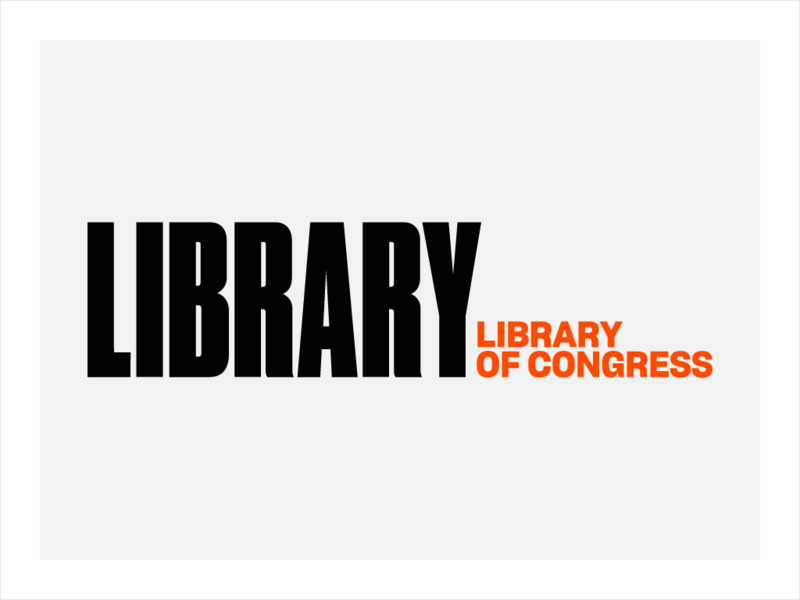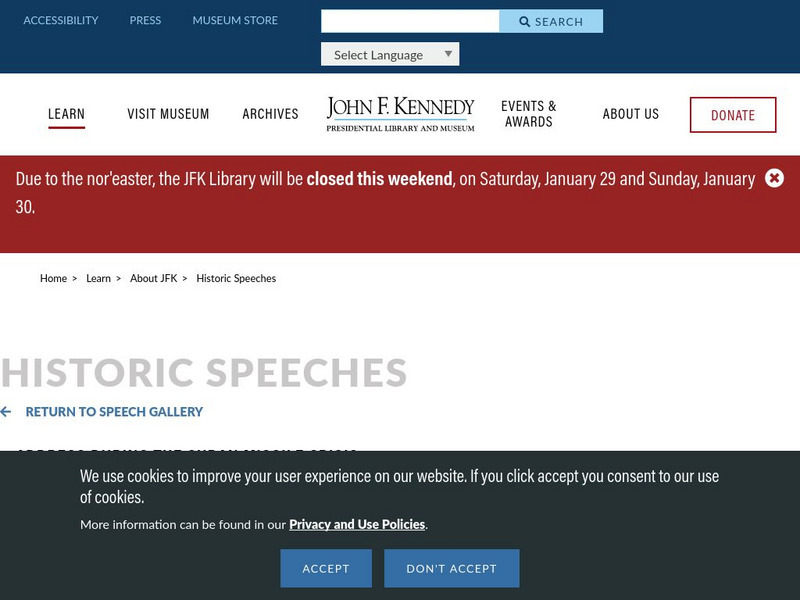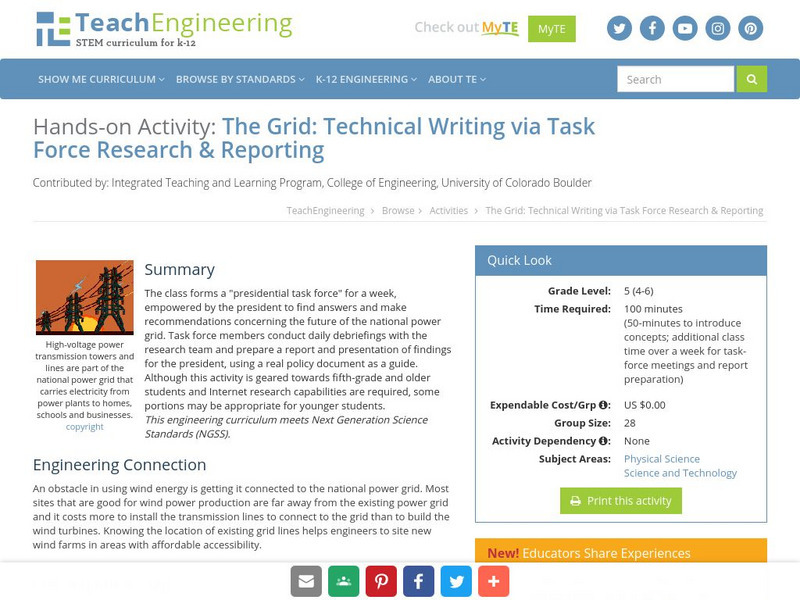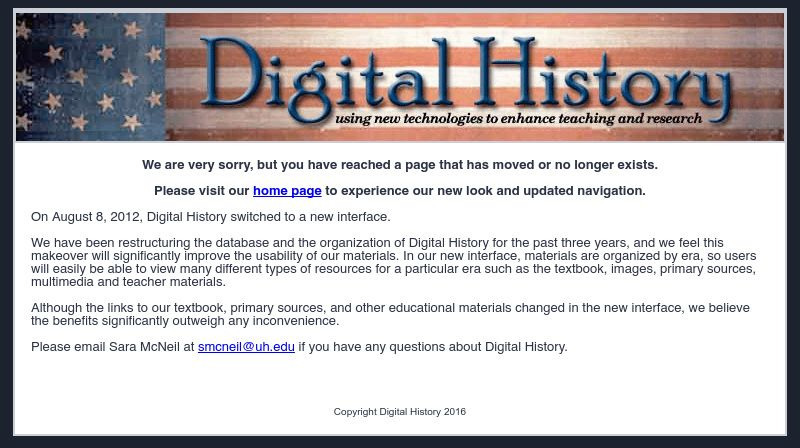iCivics
I Civics: Mini Lesson: Presidential Appointments
Students learn about unilateral presidential appointments, nominations, and the Senate confirmation process.
iCivics
I Civics: Mini Lesson: Veto Power
Explores the presidential veto and pocket veto powers, their role as a negotiating tool, and the Congressional veto override process. Students also learn how to use fact-checking and triangulation to evaluate news claims and detect...
Library of Congress
Loc: Law: War Powers
Find the reasoning behind the War Powers Act, passed over President Nixon's veto in 1973. Presidential actions taken during the Vietnam War were the impetus for Congress to make a declaration of war more codified. See the times...
US Government Publishing Office
Ben's Guide to u.s. Government: President's Legislative Powers
An easy-to-understand discussion on the actual legislative powers of the president and the veto. Includes related links.
Annenberg Foundation
Annenberg Learner: Democracy in America: The Modern Presidency: Tools of Power
This unit details how the role of the President of the United States has evolved to the position it is today since the ratification of the U.S. Constitution. Offers video, readings, web resources and activities.
US National Archives
National Archives: Congress at Work: Presidential Veto
The veto process is an integral part of our checks and balances. Introduce the power of the presidential veto and override to a class using an example from President Nixon's administration. Materials include the Constitution, worksheets,...
PBS
Pbs Online News Hour: Obama's Transition to Power
PBS provides in-depth news coverage of Obama's presidential transition including analysis, interviews, background reports, a list of key positions (named as they are filled), and related links. Continuously updated.
John F. Kennedy Presidential Library & Museum
John F. Kennedy Presidential Library and Museum: Soviet Arms Buildup in Cuba
An audio recording of a speech given to Americans by John F. Kennedy on October 22, 1962 where he talks about the buildup of Soviet military power in Cuba. A transcript is also provided. [17:37]
Thomson Reuters
Find Law: u.s. Constitution: Article Ii: Powers and Duties of the President
This resource provides the annotation on Section 2, Clause 1 of the United States Constitution., which outlines the President's responsibilities as Commander-in-Chief.
iCivics
I Civics: Mini Lesson: Pardon Power
Lesson teaches about presidential pardons, commutations, and the limitations of these powers.
A&E Television
History.com: How John Marshall Expanded the Power of the Supreme Court
When John Marshall was appointed chief justice of the U.S. Supreme Court in 1801, the nation's highest court occupied a lowly position. There was no Supreme Court Building in the newly completed capital, Washington, D.C., so the six...
Thomson Reuters
Find Law: Article Ii: The Creation of the Presidency
A scholarly discussion of Article II of the U.S. Constitution, which establishes the executive branch of the U.S. government. Discusses the origin of the article and the debates on executive power that took place among the Founding...
Smithsonian Institution
National Museum of American History: American Presidency: A Glorious Burden
Review the lives and careers of the presidents (current through 2001), particularly the burdens that the office imposes, by examining documents and artifacts that clarify the powers of the office, the role of presidential campaigns, life...
Other
Presidents & the Constitution: War: Commander in Chief
The President of the United States has many powers. This site provides an extensive overview on the President's role as Commander in Chief and includes a video.
Wikimedia
Wikipedia: President of the United States
This is a comprehensive article on the presidency of the United States. Learn about the history of this office, its responsibilities and its powers.
Yale University
Avalon Project: Constitution of the United States: Article Ii
Read the text of Article II of the Constitution, the four sections of which lay out the powers and duties of the executive branch of the federal government.
US National Archives
Nara: Teaching With Documents: The Treaty of Guadalupe Hidalgo (Activity)
The National Archives and Records Administration (NARA) provides a instructional activity, focusing on the treaty of Guadalupe Hidalgo, that relates to the power granted to the President and the Senate to make and approve treaties with...
Edutopia
Edutopia: Presidents' Day: A Life Lesson for Students
With this resource, teachers can lead students in a topical conversation regarding President's Day. This free-form lesson includes suggested questions and encourages student discussion about the powers and responsibilities of the...
TeachEngineering
Teach Engineering: The Grid
The class forms a "Presidential Task Force" for a week, empowered by the president to find answers and make recommendations concerning the future of the national power grid. Task force members conduct daily debriefings with their...
Khan Academy
Khan Academy: Federalist No. 70
This study resource from Khan Academy discusses the Federalist No.70. This information is intended for students taking high school or college level American Government and Civics courses, including the AP Government course.
Digital History
Digital History: The Clinton Presidency
Short, but comprehensive, synopsis of Clinton's two terms as president. Included in the article is the 1992 campaign, successful and controversial legislation, and the scandals that would eventually become part of his presidential legacy.
Center For Civic Education
Center for Civic Education: What Is the Role of the President?
The president has great power granted to him under Article II of the Constitution, while at the same time extensive limits have been placed to keep that power in check. This source contains extensive background on these powers and...
US Government Publishing Office
Ben's Guide to u.s. Government: The President of the United States (9 12)
Summarizes the role of the President as the Head of the Executive Branch and the powers and duties assigned to him by the Constitution. Provides links to further information.
Social Studies for Kids
Social Studies for Kids: The Presidential Veto
The President of the United States has extraordinary power over the shaping of federal laws. He or she can veto any law passed by Congress.













